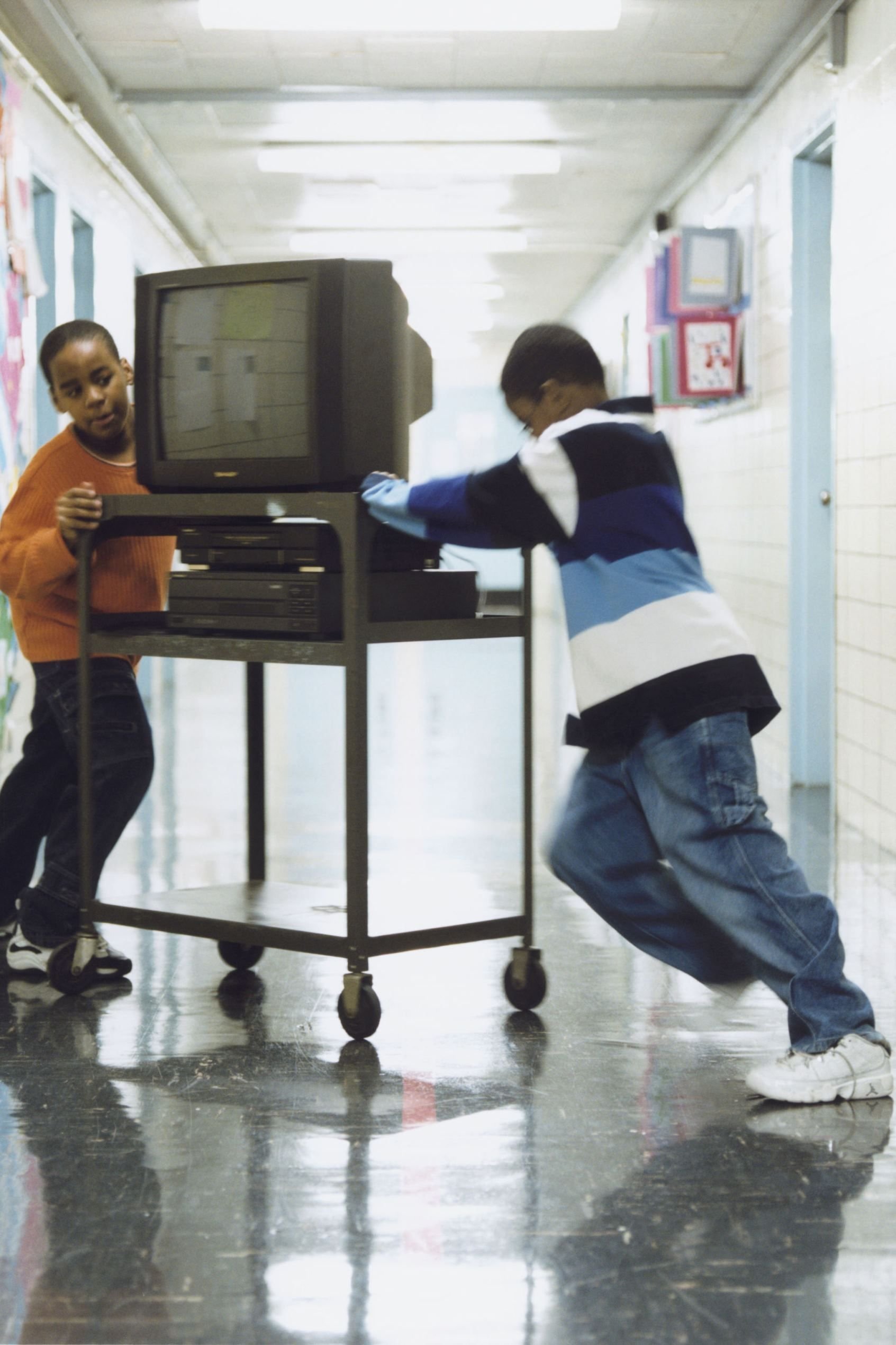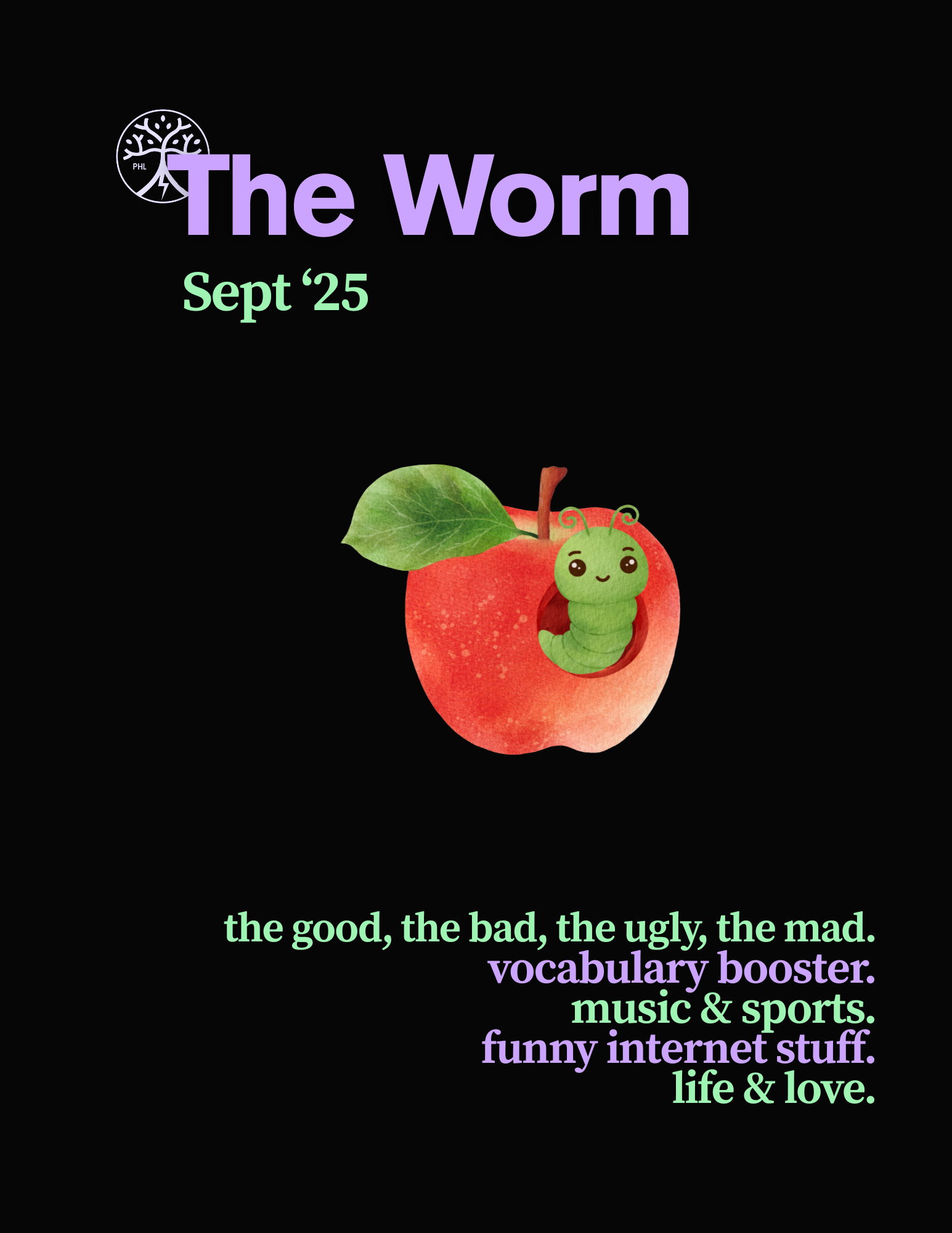Teachers with Unlimited Resources vs. The Modern Attention Span
Every kid loves a video day in class.
Whether it’s a Bill Nye episode, a History Channel segment, an unrelated movie as a reward for good test scores, or nothing more than a cool, dark hour for an exhausted teacher…
The moment the TV gets rolled in on that squeaky metal cart and the lights shut off…
Hellllllllllll yeah.
It’s not just a lazy day. Quizzes and discussions tend to follow the video segment. Curriculum-related video content can help perk the interests of students that snooze through lectures. The multimedia content in supplementation, and in contrast, to daily lectures can be a very beneficial learning tool.
At this point, even the most captivating teachers can support their own efforts by mixing in screen time.
It’s only natural at this point. It’s what the kids know.
Natural Engagement Through Unnatural Exposure
We’re living in a world dominated by wi-fi access and handheld LCD screens that offer infinite amounts of engaging and entertaining content at the tip of our fingers. The screen time from every generation has increased each year since the phone was put in the pocket and I have done zero research to back that statistic up.
Our active and barely conscious attention bounces from phone to computer to tablet to watch—across multimedia platforms constructed by social media algorithms designed to keep you scrolling.
We’re connected to our devices at a Pavlovian threshold like flies to shit.
We have become the goldfish.
The average human attention span is now less than that of the Goldfish.
What was once an absurdist joke has now become reality for the majority.
It’s only natural that our attention spans are shrinking when they’re up against this kind of neural tethering.
And this exists across generations—those that grew up with it in their hands, and those that did not.
IT’S A PROBLEM.
In a sense, it’s a competitive One.
Now, that’s not to say education isn’t evolving along with it. The utilization of laptops, smart boards, tablets, and any other affordable tech has become a focus for school districts around the world. As education moves further into the online space, new resources and lesson plans unveil themselves. Good schools certainly do their best to implement some of these new educational tools, but not every school has the funding to implement innovative approaches to curriculum, train the staff to utilize them properly, keep experienced teachers on staff, and support inexperienced teachers all at the same time.
So how else can we support educators and students to break through algorithmic attention spans? How else can we engage a darting young mind?
I’m no expert but the easy, broad answer is to support teachers and innovate education.
Again, I’m no expert, but I can’t imagine this kind of curriculum is beneficial to that goal:
Real Curriculum from a 2nd Grade Public School Classroom in Delco
I don’t like either of these questions. The way they’re worded makes me sick.
It’s like they’re preparing the students for a riddle from a troll, rather than the PSSA’s.
The Demand on TEachers and The Pushing Forward of ill-equipped Students
Don’t take it from me. Take it from the Delaware County School District 2nd Grade Teacher who has taught the above, mandatory curriculum.
First and foremost we need to let students be kids, but with all the pressure on teachers to get all the curricula completed in a 180 day school year, that eliminates a lot of social opportunities and fun activities that students should be expected to be doing.
One of the greatest stresses on teachers today is the accountability to which we are held. Of course, we should be held to a high standard. However, each year the standards and expectations get more advanced. I have second graders today doing math that 4th graders were doing a few years ago. The curriculum is so jam packed; there is not enough time in the school year to go into depth on these topics. Therefore, students are never really mastering a skill. These students who do not master these skills in the allotted time still move onto the next grade level, because of No Student Left Behind, without the foundational skills needed to perform on grade level. What we see happen because of this lack of foundational skills are behavior issues. Students tend to act out because they do not want to appear "dumb" in front of their classmates.
Overall, I think we are just asking too much of students and teachers.
So how do we combat low funding, shorter attention spans, and increased demand on teachers and students?
Combatting the Clutter; Fighting Inexperience w/ Innovation
There are plenty of ways teachers (and parents) fight the good fight today.
Screen time rewards for good behavior and restrictions for the opposite are beneficial, but kids find their way around those blockades.
Group projects are great. Active immersion towards a common goal with peers, actual student-to-student interaction—vital elements to the mental development of any growing human. Of course all inventive and creative teachers are capable of developing the proper learning atmosphere in their own special way. Still, these creative in-classroom solutions often lack the ability to further engage students at the core of the curriculum (because it’s tough to do so!!). Math class can’t always be a group project. Rhe science experiment first needs an explanation of the hypothesis. Before the social studies debate takes place, the students need to be informed on the issue.
Unfortunately, not every teacher is awesome and experienced.
Not every school has the resources to properly support young teachers.
We need new ways to engage students and keep up with today’s content…
so maybe we should fight fire with fire…
Masterclass for K-12 Education
You’re probably familiar with the MasterClass series: Scorsese teaches directing, Steph Curry teaches shooting, Mark Ronson teaches music production, and so on…
The idea is a MasterClass series for education. Subject by subject, grade by grade, one of the best teachers in the country conducts a semester with the help of a full production team—videographers, cartoon animators, graphic designers, joke writers, whatever else is deemed valuable to young educational programming.
These MasterClass courses could take place on lecture days with the in-house teacher handling questions, aiding the lesson in real time, and of course managing the class as they normally would.
This could also benefit young teachers by watching and learning from one of the best in their field on a daily basis.
This should be A Supplemental Educational Tool
Not a Replacement for any Teacher
In theory, I think it seems like a valuable tool to add to the educator’s belt, but in practice it might not translate as well. The results would surely vary classroom to classroom, subject to subject. Most importantly, it needs to be a supplemental program for an inexperienced teacher, not a replacement. It can’t be.
Lesson could be both pre-recorded and live. Masterclass teachers could be teaching their actual class or talking to the camera. It’s likely that option would not allow students to engage directly with the virtual teacher; therefore, it would be vital for the in-person teacher that’s already in charge of the class to be fully engaged in this new video-oriented curriculum by progressing students at the right speed, pausing the lecture to add further insight and answer questions, manage the lesson schedule in conjunction with the class’s understanding of the material week-by-week, and to run the classroom as they normally would otherwise.
Considering the potential product-to-scale opportunity of pre-recorded video series streaming throughout the country, it’s possible that the end result would be a relatively affordable option for school districts. There are also quite a few subjects and grades and various ways to approach that curriculum, so it will likely be tough to develop a universal catch-all series for for 7th grade social studies, whereas Algebra II is probably easier to address on a broad scale.
Considering the obvious economics of it, a few thoughts occur…
This Could give school districts a reason to freeze, or even lower teacher salaries…
To that I say,
fuck that.
Ideally, a program of this magnitude wouldn’t remove a single job.
Instead, it would be used as a tool for poor, struggling schools to increase the years of experience in the classroom and lend a virtual hand to young teachers. It would also help them grow as a teacher from watching one of the best teachers in the country conduct lecture after lecture, doing so essentially side by side.
Where I think this could be most beneficial is in the time shift focus away from overall classroom teachings to individual focus. Larger classrooms especially. This is a very important factor to student growth and successful curriculum implementation across the board. It’s why every school should have its own school psychologist, if not multiple.
A rowdy classroom might even benefit from a teacher who’s patrol ability just increased.
That thought scares the 5th grader in me.
Bottom line:
It’s an interesting supplemental solution to consider in a time where new ideas should be welcome in an age of education that’s catering to a generation dominated by screen time.
Some Kneejerk Thoughts on the Implementation
Students could probably benefit from the interaction between the teacher and their in-person class. Naturally, some parents will hate the idea of their kids being on film. I’m sure there will be plenty of parents and students willing to participate. Kids would probably be enticed to go back and watch the lesson again to see themselves and their classmates on the TV!
I believe class could commence as it normally would and should not require any extra people to be in the classroom. It should not require any extra people to be in the classroom to film it as cameras and mics could be mounted, then adjusted remotely.
I am not personally an educator or an expert on curriculum, but I imagine the vastness of the grades, subjects, and varying curricula for each, it could be very tough to consistently nail down a complete, universally-accepted, masterclass. I imagine Algebra II is probably a lot easier to do than Social Studies.
Another thought… the awful social media parent wars that would take off every time one of the popular masterclass teachers might lean towards a political party on either side.
“You see the agenda they’re trying to force on our kids?!”
P.S.
A Sociology Thesis:
Rockstar Teachers are Good for Humanity
Yes, on a broader, more sociological perspective, I also see this as a win for humanity.
Why?
By the biblical law of social media, this amount of content and exposure at a potential national scale will birth more than a few famous teachers, especially if they’re picked properly. There will certainly be the Mister Rogers-esque Social Studies Teacher that adds in some valuable sentiment on intense subjects. There will also be the hot math teacher (who is also awesome at their job) that the kids (and parents) might have a crush on.
For society as a whole, Rockstar Teachers are a great way to combat the insurmountable number of talentless and useless celebrities that are thrust forward in the exposure war we fight with strength and valor against LCD algorithms for the homemade bowl of chicken noodle soup etched in our children's souls.
Too dramatic?
shout-out to my Favorite Teachers
But at the end of the day, it makes me think of all the awesome, irreplaceable teachers I’ve had throughout my life.
Dr. John Marra—college writing & advertising professor
Bill Brown—9th grade social studies
Mrs. Harvey—4th grade core classes
John Bascelli III—6th grade language arts
Dana Saewitz—college advertising & media
and so many more….
I hope that everyone has had the experience of learning from a life-changer of a teacher.
\













